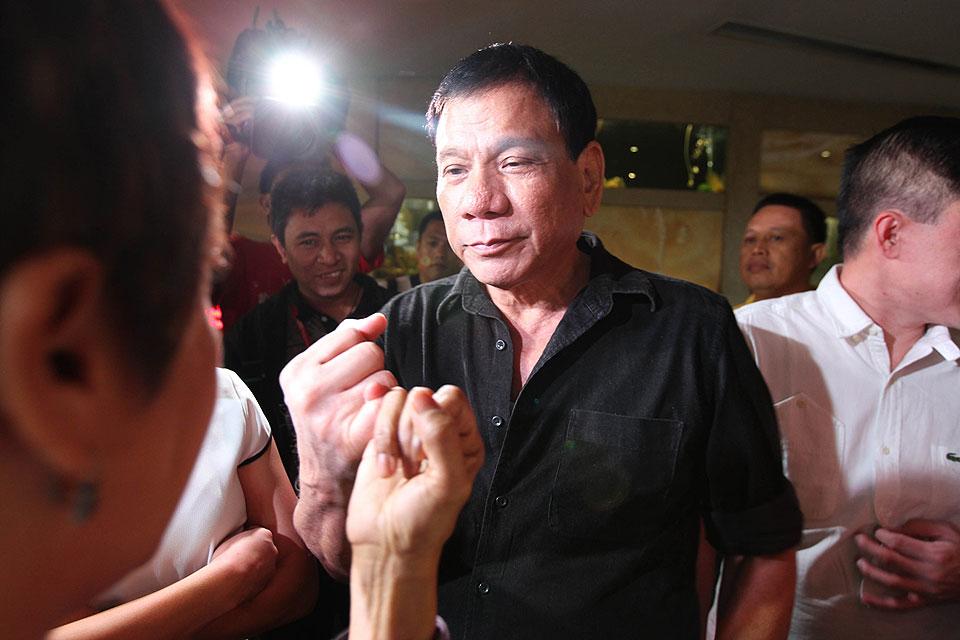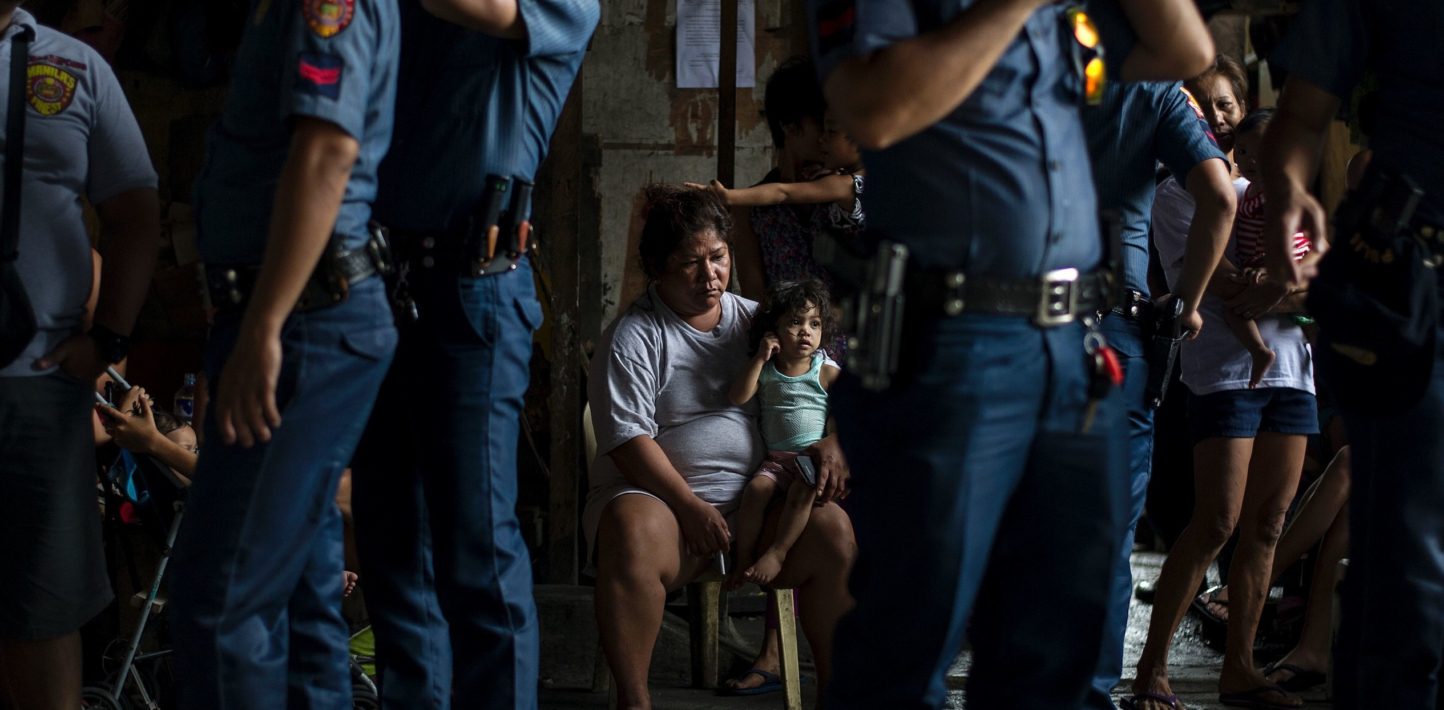
Image Source: GMA News
“I would stop drugs, crime, and criminality in three to six months”
-Rodrigo Duterte in his 2016 Presidential Campaign
The Philippines has long grappled with maintaining order and stability, often in response to perceived societal unrest. From a Hobbesian perspective, the unpredictability of human nature drives individuals to give up their freedoms in favor of security and governance. But does this phenomenon hold true in the Philippines? Are Filipinos drawn by the myth of a strong leader as a solution to its instability?
Order may be defined in two ways—at one end, a sense of an organized and structured manner; while the other end describes an authoritative command and control. The problem of order has always been dubbed as a Hobbesian problem. In Hobbes’ Leviathan, the solution to chaos and the state of nature is the establishment of an all-powerful authority. While Filipinos recognize the need for order, they juggle both terms by understanding them as two forces that should work in harmony. That is, if they wish to see order in their country, they would put someone in position to impose order despite their freedom being curtailed. This framework resonates strongly with the political history of the Philippines which can be seen in periods of political turmoil that led to the preference for a strong leader.
Building upon the International Political Science Association’s (IPSA) theme, “Resisting Autocratization in Polarized Societies”, authoritarian tendencies are gaining traction while democratic institutions are debilitating from multiple fronts. The Philippines is known for its strong democratic traditions, particularly following the EDSA Revolution, when the people fought to reclaim their freedom. For this, can we say that the country is in the minimalist school of defining democracy, where elections alone define governance? Can we say that behind the strong facade of democracy that the Philippines is known to have, lies the embodiment of a system that leans toward authoritarianism? A common thread to the preference for strong leadership stems from multiple reasons like economic insecurity, leader’s rhetoric, and cultural embeddedness—however, these are not sufficient reasons to bring the country’s long-established democracy down to its roots. This fixation over elections warrants a reexamination of people’s fear of their social climate that drives them to think that they are reassured by these strongmen.
Whenever people feel a sense of threat to their security, they often cling on to someone who embodies a tough and strong image to protect them from harm. This was reflective during Duterte’s administration where many Filipinos showed their unwavering support for the former President. This support was brought by the perceived threat in the country that led to Filipinos’ exhaustion of the recurring problems such as crime and drug use.

Image Source: Amnesty International
The law and order pitch of Duterte along with his ‘license to kill’ had differing sentiments from the electorate. Some Filipinos supported this act and justified its means to end criminality and drug use in the country. However, others were quaking in their boots with the uncertainty and severity of this. By the time Duterte was placed in position, he launched his so-called War on Drugs which is a bloody campaign that killed about 12,000 to 30,000 civilians mostly from the urban poor. The mechanism was plain and simple yet brutal. “Hitler massacred three million Jews. Now there are three million drug addicts (in the Philippines). This unfiltered remark sums up the violent campaign of Duterte where mostly slum dwellers and the urban poor became the primary targets. Duterte equated drug users as enemies of the country. Not only did the former president normalized mass violence but he also stripped these victims of their right to due process. Suspected users and pushers were gunned down without thorough investigation, trial, nor evidence—many of them innocent were caught in the system built on fear and impunity. The due process was abandoned in favor of fear towards the authority, as the state normalized killings in the name of order that the former president gave. This reflects the Duterte’s cynicism over the judicial system. For him, it was a form of control and a mere fulfillment of his duty; for his supporters, swift justice delivered by a father figure; and for critics, a descent into authoritarianism and a dangerous slide of democracy.
This divide underscores a troubling reality for the democracy of the Philippines—first, it manifests the gradual erosion of democratic norms and institutions in the country. The appeal of strongmen leaders should be marked as danger since it desensitizes the leaders’ accountability towards the electorate with their mere use of power. In this way, people are unconsciously and unintentionally eroding democracy. The said fears of people, however, are strategically being used by strongmen to capitalize on them and to further consolidate power. Strongmen like Duterte restructures institutions and undermines public trust by failing to address the needs of people and using authoritarian approaches to achieve the desired order. They act as political entrepreneurs that exploit grievances, in this case, the criminality, to create an “Us versus Them” dynamic and push their personal interests often hiding in a facade of patriotism and public service.
Second, placing authoritarian leaders overrides the concerns about human rights often to the extent of killing people to prove their toughness. The normalization of choosing strong leaders is giving up one’s freedom which is a facet of democracy. Although people are free to choose their leaders, they do so in exchange of their own freedom.
Filipinos must be aware that fear, while a potent political force, does not equate to one’s manipulation. Hence, these fears can catalyze civic participation and institutional strengthening. Keeping the country’s democracy intact requires a shift in one’s way of thinking—these strong leaders offer short-term solutions, especially for their personal gain. People should recognize, however, that fear should be empowered and not surrendered. There should be a clear consensus on our part that violations of all should not warrant extrajudicial measures no matter how deemed needed by the state.
As the Philippines navigates its democratic future, it is imperative to move beyond the illusion that a strong leader alone can fix deep-seated societal issues. Instead, the focus should be on strengthening democratic institutions, civic engagement, and accountability mechanisms. Fear-driven politics may offer short-term comfort, but it risks dragging the country further into a cycle where democracy is merely an electoral exercise rather than a true system of governance based on the rule of law and the protection of fundamental freedoms. The myth of a strong leader is a dangerous fiction that people consume. Filipinos must break free from this cycle of myth and bust the false choice between freedom and order. If this order is nothing more than a chain etched to bind one’s freedom in the advantage of another, then it is not order at all but subjugation disguising as stability.

I particularly appreciated your implementation of IPSA’s resisting autocratization in polarized societies, because I think this perspective might speak to a lot more cases. I also really liked how your analyses were actionable as well, such as turning fears into civic engagement instead of complacence. I also found your ending declarations especially powerful for aiding to strip the image of what is going on in the Philippines.
Thank you, Lorraine. I appreciate your thoughtful feedback. I do agree that IPSA’s framework helps make sense of complex situations of autocracy around the globe. Focusing on practical actions, like channeling fear into civic engagement, is essential given the current political climate. It’s important to stay grounded and realistic while looking for ways to navigate these challenges.
The notion of Filipinos being drawn to strongmen or authoritarian leaders reminds me of Dr. Remigio Agpalo’s theory of the pangulo regime. He talks about how a Filipino polity functions under the leadership of a pangulo (head) who is paternalistic, strong, and unyielding. This system is based on Filipino values and culture. I’ve always seen this theory as a justification for authoritarian rule based on underlying cultural values.
I think that the unyielding preference of people for authoritarians such as Duterte is rooted in a political culture that glorifies strength, machismo, and perhaps chauvinism. This is something that we should further interrogate because in spite of all the things that Duterte has done, people (especially those loyal to him) still prefer to have leaders like him. A balance of institutional overhauls and a shifting of political culture is perhaps necessary if we want to prevent another Duterte-like figure from ever gaining the presidency once again.
It is saddening how, despite Rodrigo Duterte’s arrest by the International Criminal Court, some Filipinos continue to justify Duterte’s war on drugs as if the number of drug-related deaths recorded during Duterte administration is a measure of the former President’s success and not a figure that confirms thousands of lives lost, families orphaned, and hopes taken away.
Indeed, although our gravitation towards strong leaders is rooted in factors such as economic security, leader’s rhetoric, and cultural embeddedness among others, there is still hope left for us. Besides strengthening democratic institutions, civic engagement, and accountability mechanisms, we must also make sure that the information that the people consume is not produced by disinformation networks. The people cannot make their leaders accountable if they are not aware of their wrongdoings in the first place. Although combatting disinformation would require reforms in a lot of our institutions (e.g., education and media), we can make small steps by informing ourselves with factual information and sharing our knowledge with the people that we know.
Our leaders are not superheroes who can solve all of our country’s problems in a span of a few months. Institutional challenges require institutional reforms, economic challenges require economic reforms, educational challenges require educational reforms, illegal drugs-related challenges require illegal drugs-related reforms, and the list goes on. May we not repeat the mistake of catapulting someone to power who will once again fill our streets with bloodied bodies, and may blogs like this continue to remind the people of the dangers of an illusion of a strong leader in democracy.
I certainly appreciate and agree with your remark. It’s alarming how many people still defend the conflict on capsules by way of pointing to loss of life tolls as though they’re achievements, instead of symptoms of systemic failure and human rights abuses. I agree that our tendency to look for “strong” leaders stems from deeper issues like insecurity and cultural narratives, but that should never be an excuse for the damage.
Additionally, how are we able to assume citizens to call for accountability if the reality is being distorted or hidden by those powerful themselves? It’s now not just about incorrect information online; it’s also how the media reports, or even what conversations we normalize in normal life. Hopefully, we’ve learned enough not to fall for the same “strongman” image again.